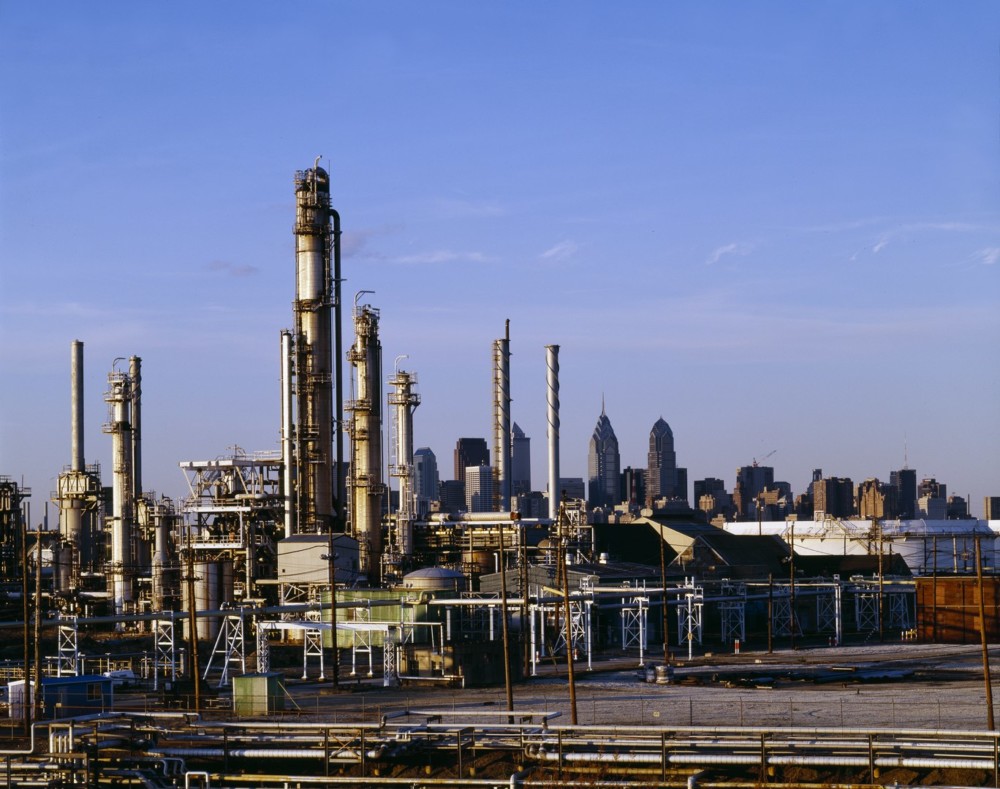
Why Environmental Groups are Encouraged by PES Refinery sale
Hilco has redeveloped other industrial properties in other U.S. cities like Baltimore, Boston, and Chicago.
UPDATE (Feb. 14, 2019): A federal bankruptcy court judged reportedly approved Hilco’s purchase of the shuttered PES refinery after the Chicago-firm raised its bid to $252 million. The Inquirer explains how a rival development firm helped lead Hilco to increase its offer by $12 million.
Local environmental justice group Philly Thrive says it already connected with the CEO of Hilco Redevelopment Partners, the expected buyer of the shutdown Philadelphia Energy Solutions refinery.
Bankruptcy court documents filed Wednesday confirmed Hilco’s $240 million bid for the 1,300-acre site, though the Illinois-based real estate company has not yet announced plans for the Southwest Philly property. Approval of the sale is slated for a Feb. 6 bankruptcy court hearing.
“We are encouraged by examples like offshore wind development that is one of the land uses that Hilco has been able to attract at their sites.”
Alexa Ross, Philly Thrive
With Hilco’s specific redevelopment plans unclear, Philly Thrive is hesitant to declare the impending sale a win. One positive signal, however, is the line of communication between the group and Hilco CEO Roberto Perez has already opened, according to Philly Thrive organizer Alexa Ross.
“We will be having an in-person meeting with Hilco leadership as soon as the sale is final,” Ross told Green Philly. A Tuesday evening email from Philly Thrive leadership to Perez prompted the executive to call them Wednesday morning, she said. “Mr. Perez said he is very aware of Philly Thrive and our central goal of keeping the refinery shut down.”
Green Philly inquiries to Hilco regarding the sale and phone calls were not immediately returned.
Hilco has redeveloped mills, power plants and other challenging industrial properties around the United States – a background that suggests its ownership is a step in the right direction, Ross said.
“We are encouraged by examples like offshore wind development that is one of the land uses that Hilco has been able to attract at their sites,” she said, referring to the 50 acres in Tradespoint Atlantic in Baltimore leased to Ørsted U.S. Offshore Wind. “That would be a best-case scenario, bringing renewable energy development.”
Update: Shortly after this story was published, WHYY reported that Philadelphia’s managing director and co-chair of the city’s Refinery Advisory Group, Brian Abernathy said Hilco indicated a refinery is not part of its plans and the “majority of the site is likely to be used as warehouse and logistics space for other development.”
While an improvement over a refinery, warehouse and logistics uses still raise red flags for Philly Thrive.”We will definitely be on alert for projects that will bring more trucks and pollution into this area,” Ross said.
Like Philly Thrive, Philadelphia-based Clean Air Council described Hilco’s impending purchase as a partial victory, though both organizations said they will continue to keep a close watch on the buyer’s plan for the Girard Estates property.
“With Hilco’s proposal likely to be approved by the bankruptcy court, we are cautiously optimistic about the opportunity for the site to be much less polluting than its previous use as a refinery,” said Clean Air Council Executive Director Joseph Otis Minott in a statement. “The public must now do everything it can to hold Hilco accountable for developing the cleanest and safest uses possible at the site.”
Philly Thrive’s initial list of requests for Hilco includes:
- no leasing land for refining operations
- funding to assist the public with technical participation in clean up plans
- active public involvement in plans for redevelopment
- quota for quality, union jobs to surrounding neighborhoods
The refinery has long been a source of controversy with nearby neighbors concerned about the site’s impact on their health. A series of explosions and a fire in June 2019 destroyed part of the facility, heightening locals’ worries about their exposure to contaminants like benzene. Long-term exposure to high levels of benzene, according to the Centers for Disease Control and Prevention, can cause cancer in humans.
Reports indicate the fire released thousands of pounds of a deadly chemical into the air, but it is unclear if any humans were exposed before they dissipated into the atmosphere. (Check out our past coverage to learn more about the potentially harmful effects of the refinery.)
“That’s what I want for my community: the right to breathe clean air and good jobs.”
Rodney Ray, former refinery worker and Philly Thrive member
Aside from environmental and health concerns, labor organizers are also monitoring the refinery’s next steps. Before shutting down last summer, PES was the largest refinery on the East Coast and had approximately 1,000 workers. Many of the former employees had called for a buyer who would reopen the refinery. While that path seems unlikely, the laid-off workers are still pushing for Hilco to create long-term jobs for locals.
“I want to see jobs cleaning up the refinery and in future development go to the community. Let’s get some apprenticeship programs started. I know there will be less violence and less crime if people have the option to make a decent paycheck,” said former refinery worker and Philly Thrive member Rodney Ray in a statement. “That’s what I want for my community: the right to breathe clean air and good jobs.“









